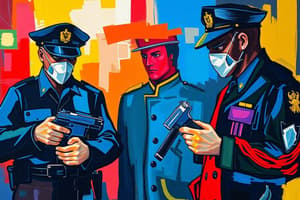Podcast
Questions and Answers
What significant reform did Alfred the Great introduce in the 9th Century?
What significant reform did Alfred the Great introduce in the 9th Century?
- The introduction of forensic techniques
- The mutual pledge system for community responsibility (correct)
- The establishment of the Questors in Rome
- The creation of the London Metropolitan Police Force
Which historical development marked the establishment of specialized investigative units in Rome?
Which historical development marked the establishment of specialized investigative units in Rome?
- The Code of Hammurabi
- The mutual pledge system
- The formation of the Questors (correct)
- The Statute of Winchester
What year did Sir Robert Peel establish the London Metropolitan Police Force?
What year did Sir Robert Peel establish the London Metropolitan Police Force?
- 1918
- 1829 (correct)
- 1720
- 1285
What foundational principle was emphasized in the Code of Hammurabi from 2100 B.C.?
What foundational principle was emphasized in the Code of Hammurabi from 2100 B.C.?
Which notable figure pioneered detective work in the early 19th century?
Which notable figure pioneered detective work in the early 19th century?
What significant advancement in crime-solving occurred between 1918 and 1999?
What significant advancement in crime-solving occurred between 1918 and 1999?
What legislative act required men to keep weapons for maintaining peace in England?
What legislative act required men to keep weapons for maintaining peace in England?
Which period is described as significant for the evolution of forensic science in criminal investigations?
Which period is described as significant for the evolution of forensic science in criminal investigations?
What is the main goal of establishing motive in a criminal investigation?
What is the main goal of establishing motive in a criminal investigation?
Which of the following best describes the 'opportunity' element in a crime?
Which of the following best describes the 'opportunity' element in a crime?
What phase follows the identification of a suspect in a criminal investigation?
What phase follows the identification of a suspect in a criminal investigation?
Which of the following is NOT a primary goal of a criminal investigation?
Which of the following is NOT a primary goal of a criminal investigation?
How is criminal investigation characterized as both an art and a science?
How is criminal investigation characterized as both an art and a science?
What characteristic is essential for a competent investigator to maintain while solving cases?
What characteristic is essential for a competent investigator to maintain while solving cases?
What is the role of a criminal investigator?
What is the role of a criminal investigator?
Which of the following is part of the steps in criminal investigation?
Which of the following is part of the steps in criminal investigation?
What is the primary purpose of the Golden Rule of Investigation?
What is the primary purpose of the Golden Rule of Investigation?
Which of the following is NOT one of the 5 W’s and 1 H used in criminal investigations?
Which of the following is NOT one of the 5 W’s and 1 H used in criminal investigations?
Which method is least likely to be used for recording an investigation?
Which method is least likely to be used for recording an investigation?
How do patterns among cases contribute to criminal investigations?
How do patterns among cases contribute to criminal investigations?
Which principle is essential for ensuring the admissibility of evidence in court?
Which principle is essential for ensuring the admissibility of evidence in court?
What role do tips from the community play in an investigation?
What role do tips from the community play in an investigation?
What is the significance of evaluation in the investigative process?
What is the significance of evaluation in the investigative process?
Which of these statements best captures the dynamic role of an investigator?
Which of these statements best captures the dynamic role of an investigator?
Flashcards are hidden until you start studying
Study Notes
Introduction
- Criminal investigation is fundamental in law enforcement, criminology, and forensic science.
- Understanding investigation principles is crucial for effective crime resolution and justice.
Unit 1: History of Criminal Investigation
- Criminal investigation has origins in ancient societies; methods evolved over thousands of years.
- The Code of Hammurabi (2100 B.C.) in Babylon introduced communal responsibility for crime.
- Rome established the Questors, specialized investigative units, in the 5th century B.C.
- Athens introduced unpaid magistrates in the 6th century B.C. to oversee crime.
- Alfred the Great's 9th-century reforms emphasized community responsibility via the mutual pledge system.
- The Praetorian Guard and Vigiles of Rome influenced the development of modern police forces.
- The Statute of Winchester (1285) established local law enforcement practices and community accountability.
- Jonathan Wild (1720s) became notable for charging fees for recovered stolen property.
- Sir Robert Peel founded the London Metropolitan Police (1829), focusing on crime prevention and modern policing principles.
- Forensic advancements (1918-1999) such as fingerprinting and DNA typing revolutionized criminal investigations.
Unit 2: Criminal Investigation
- Criminal Investigation is the systematic collection and evaluation of facts related to a crime.
- Primary goals include establishing crime occurrence, identifying suspects, and gathering prosecution evidence.
- Main elements of crime are:
- Motive: Reason behind the crime, clarifying circumstances.
- Opportunity: Access and timing for committing a crime.
- Instrumentality: Tools used to commit the crime.
- Types of investigations:
- Arrested Suspect Investigation: Follows an arrest.
- At Large Investigation: Concerns suspects who are not apprehended.
- Phases include Identification, Trace and Arrest, and Gathering Evidence.
- Goals encompass determining crime occurrence, obtaining evidence, identifying persons, making arrests, recovering property, and preparing prosecution cases.
- Investigation combines art (skill and intuition) and science (methodology and forensics).
Key Terms and Concepts
- Criminal Investigator: A professional focused on investigating crimes.
- Police Investigator/Detective: Trained law enforcement personnel tasked with criminal investigations.
- Characteristics of effective investigators include:
- Perseverance: Dedication to case resolution.
- Endurance: Capacity to handle investigation's mental and physical demands.
Unit 3: Key Principles in Criminal Investigation
- Essential investigation elements are Recognition, Collection, Preservation, Evaluation, and Presentation of evidence.
- Cardinal points involve answering the 5 W’s (Who, What, Where, When, Why) and 1 H (How) of the investigation.
- Patterns indicate potential serial crimes, leads provide key information, tips originate from community, and theories guide investigations.
- The Golden Rule of Investigation emphasizes not touching evidence at the crime scene to maintain integrity.
- Methods of recording investigations include photographs, sketches, written notes, fingerprint collection, documentation, and interviews.
Conclusion
- Criminal investigation plays a critical role in the justice system, integrating history, law, and scientific methods.
- Evolution highlights the necessity for adaptability and innovation in crime fighting.
- Mastering these foundations equips future investigators with the skills for effective resolution and justice delivery.
- Criminal investigators contribute significantly to societal safety through the integration of artistic and scientific approaches.
Studying That Suits You
Use AI to generate personalized quizzes and flashcards to suit your learning preferences.




